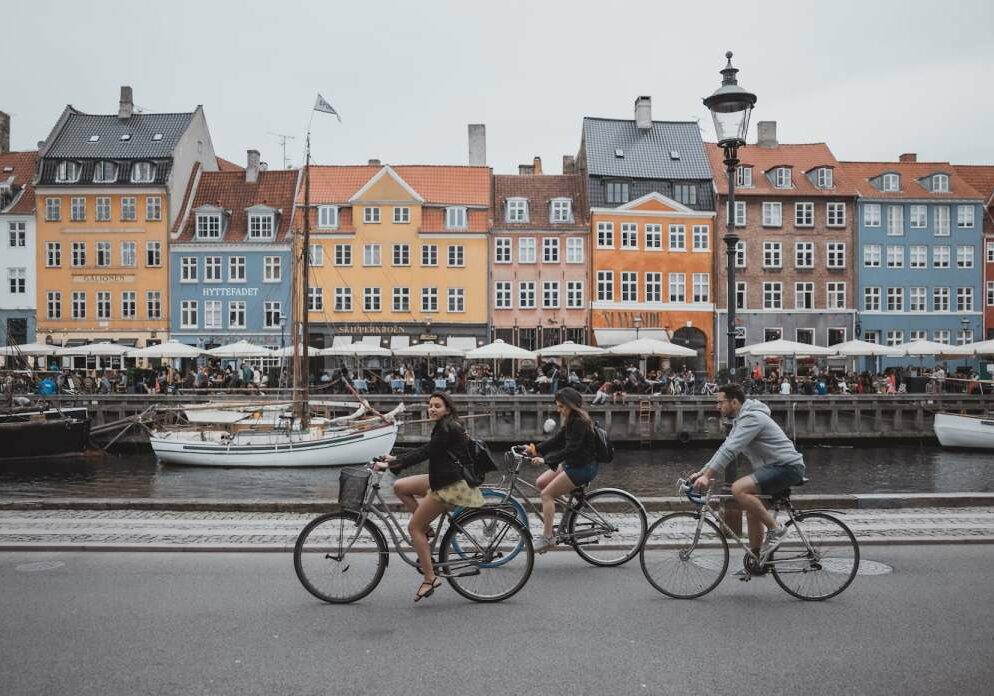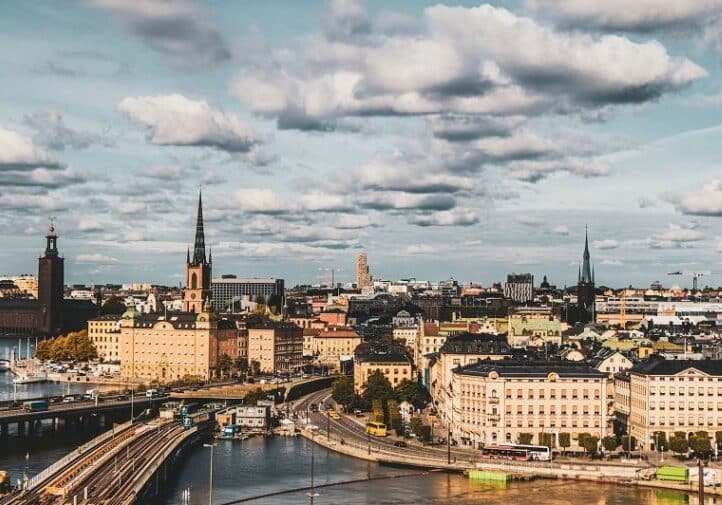When choosing the best countries to live in, consider factors like economic health, quality of life, and cost of living. A country’s GDP is key because it shows the overall wealth and job opportunities available, which can lead to a better life for residents. Look for countries with welcoming communities, universal health care, and social equality, as these factors can greatly enhance your experience.
This guide highlights the 10 best countries to live in, focusing on countries with good education, quality health care, safety, and good quality of life.
Top 10 Best Countries to Live in 2025
1. Denmark

Quality of Life: The country ranks fourth on our Quality of Life Index. This is due to overall citizen happiness, safety, and income equality. Its relaxed lifestyle and bike-friendly cities contribute to a stress-free environment.
Education: Education, which emphasizes critical thinking and creativity, is free at all levels, including higher education, for EU citizens. However, it’s relatively easy to gain EU citizenship by investment, which then gives you access to this free university education.
Healthcare: Denmark offers a universal healthcare system funded through taxes, providing high-quality medical services to residents. The quality of their healthcare is evidenced by the Danes’ high average lifespans and low mortality rates.
Cost of Living: Denmark is known for its high living costs, especially in cities like Copenhagen, but most people find that the quality of life and welfare services balance these costs. Monthly expenses in Copenhagen typically range from $2,500 to, with housing and dining being among the more expensive items.
Metric | Value |
GDP | $408.51 billion |
Average Annual Salary | $63,000 |
Average Cost of Living | $2,176 - $4,352/month |
Quality of Life Ranking | 4 |
2. Norway

Quality of Life: Norway is one of the top-ranking countries for quality of life due to simple factors such as good governance, income equality, civil rights, low unemployment, and a high net worth per capita. It was the first country in Scandinavia to legalize same-sex marriage, making it a LGBTQ-friendly country. It’s one of the best countries in the world to work, with an average salary of $55,000 compared to $51,480 in the United States.
Healthcare: Like most Nordic countries, Norway has an excellent healthcare system that is efficient and simple. Private medical insurance is not required, as all residents have access to relatively free health care (with the exception of a nominal fee paid for certain services until reaching an annual cap). The government subsidizes prescriptions and has a low universal cost, making them very affordable regardless of what kind of treatment you require.
Education: Not only is Norway’s well-developed public education system free, but EU and EEA students are also eligible to receive a free bursary to support their education that does not need to be paid back. Although international students no longer have access to free university education in Norway, the tuition fees are significantly lower than what students pay in the US, averaging 130,000 NOK (about $12,000) per semester.
Cost of Living: Norway is another one of the more expensive countries in Europe, with Oslo and Bergen having higher living costs. Monthly expenses in Oslo generally range from $2,700 to $3,500, while smaller towns are slightly more affordable.
Metric | Value |
GDP | $482.23 billion |
Average Annual Salary | $65,281 |
Average Cost of Living | $3,500/month |
Quality of Life Ranking | 8 |
3. Sweden

Quality of Life: Sweden offers a fantastic standard of living and is often ranked as one of the best places for expats. It has a high level of freedom, low crime, a strong economy, and plenty of well-paying job opportunities. Although living costs can be high, Sweden’s safety and quality of life make it a top choice. While Swedish is the main language, fluent English is widely spoken by nearly 90% of the population under 60, making it welcoming for English-speaking expats.
Healthcare: Unlike most Scandinavian nations, the Swedish healthcare system is decentralized and mainly government-funded. Still, local authorities decide how it’s run and how much the total healthcare budget will be through local taxes. Private global health insurance is available for those who want access to more healthcare options and faster treatment. It costs as little as $375 annually.
Education: Sweden has a tax-funded, well-developed, and decentralized public education system. The government grants local authorities autonomy in designing course curricula as long as national standardized goals are met. A growing number of independent educational institutions in the country are also funded through taxes. Children can choose whether to attend a public municipal school or an independent one. Additionally, from the age of three, the STEM (science, technology, engineering, and mathematics) curriculum is heavily incorporated into schools.
Cost of Living: Sweden can be moderately expensive, with cities like Stockholm having higher living costs. Monthly expenses in Stockholm range from $1,800 to $2,900, with housing and dining being the main expenses. Smaller cities and rural areas offer a more affordable lifestyle.
Metric | Value |
GDP | $615.67 billion |
Average Annual Salary | $51,745 |
Average Cost of Living | $2,900/month |
Quality of Life Ranking | 1 |
4. Switzerland

Quality of Life: It is home to the World Economic Forum and is one of the world’s wealthiest countries per capita. It has one of the world’s most stable political systems and has long been neutral regarding politics. Swiss residents benefit from outstanding governance. Everything is highly refined, from public transport and healthcare to state education and digital services.
Healthcare: Switzerland has a mandatory private health insurance system, ensuring residents access to affordable medical coverage, with costs ranging from $330 to $2,750 per year. Each canton manages its policies, but residents can expect high-quality healthcare.
Education: Switzerland ranks highly in education, offering free public secondary education and practical training. A recent OECD survey of educational standards among 15-year-olds placed ninth out of 65 countries. The country also provides vocational education and training (VET) programs that combine classroom learning with on-the-job experience. Children with special educational needs receive free schooling and support until age 20.
Cost of Living: Although Switzerland has one of the highest living costs of all European countries, the average salary is also one of the highest in Europe. Monthly living expenses in Zurich range from $2,500 to $3,500, depending on accommodation and lifestyle choices.
Metric | Value |
GDP | $824.74 billion |
Average Annual Salary | $93,827 |
Average Cost of Living | $2,500/month |
Quality of Life Ranking | 46 |
5. Australia

Quality of Life: Although slightly further afield, the most populous nation in Oceania has a number of excellent quality-of-life factors that make it the perfect home away from home.The country has a stable and strong economy and maintains political neutrality. Additionally, Australia ranks as having a high standard of living regarding healthcare, a wide range of educational opportunities, a safe environment, and a welcoming community.
Healthcare: The nation’s life expectancy ranks as one of the highest according to the UN Population Division. Australia’s healthcare system, Medicare, provides all residents with access to essential medical services at no or low cost. This covers hospital visits, doctor consultations, and other necessary treatments. Expats can access Medicare if they are permanent residents, while temporary residents typically need private health insurance.
Education: Australia is home to a world-class education system, offering high-quality public and private schools and prestigious universities. Public education is free for residents and expats, although there may be some additional costs for materials and extracurricular activities. Primary and secondary education includes a broad curriculum that is perfect for students to find their passion.
Cost of Living: The cost of living in Australia can be relatively high, especially in major cities like Sydney and Melbourne, where rent, dining out, and entertainment expenses can add up quickly. In these cities, monthly living costs can range from $2,500 per month or more, depending on lifestyle choices
Metric | Value |
GDP | $1.53 trillion |
Average Annual Salary | $54,126 |
Average Cost of Living | $2,500/mont h |
Quality of Life Ranking | 24 |
6. The Netherlands

Quality of Life: Despite having the highest population density of all the large economies in the European Union, the Netherlands’ profound cycling culture consistently places it in high positions on low air pollution indexes. It maintains clean air quality even in compact cities.
Healthcare: Healthcare in the Netherlands is excellent, with a strong public health system that provides quality services to all residents. The system operates under a mandatory health insurance scheme where everyone must have basic insurance covering primary and specialist care. The quality of care is consistent nationwide, with an emphasis on preventive health services and patient-centered care. Expats may opt for private health insurance for additional services or faster access but are assured of receiving dependable care through the public system.
Education: The Netherlands is known for its high-quality education system, where public schools are free and offer a curriculum that encourages independence and problem-solving skills. The most recent Global Education Report, the Netherlands’ education system stands out due to its affordability and moderate comparative living costs as well as the creation of an innovation ecosystem.
Cost of Living: While the Netherlands’s cost of living is relatively high compared to some other European countries, it is manageable and is reflected in the high quality of services one can access. In major cities like Amsterdam, monthly living expenses average between $2,500 and $3,000, largely driven by housing costs.
Metric | Value |
GDP | $1.04 trillion |
Average Annual Salary | $57,335 |
Average Cost of Living | $2,500/mont h |
Quality of Life Ranking | 7 |
7. Finland

Quality of Life: Although this relatively isolated country in northern Europe can be a bit pricey due to high-income taxes, the benefits are enormous. Crime rates are criminally low, with it being one of the safest countries in Europe and the world. It also has the lowest pollution with the best air quality in the world. Tap water purity is also amongst the highest of any nation.
Healthcare: Finland has one of the best healthcare systems in the world, offering universal healthcare to all residents, including expats. The country has a mix of public and private healthcare, with primary care available through government health centers and specialized hospital services. Expats are required to register for Finnish health insurance if they plan to stay long-term, but private healthcare options are available for those who want quicker access to additional services.
Education: Daycare is heavily subsidized by the government and is calculated based on income, costing a maximum of €342 per month for full-time daycare, as opposed to a market-based economy like the US, with an average cost of $840. Generally, Finland’s education system is great. Many international schools offer English-language curricula, making it easy for children to integrate into the educational system. Higher or university education in Finland is also free for EU residents and offers a range of English-language programs for international students.
Cost of Living: While Finland is known for its high living standards, the cost of living can also be high, particularly in cities like Helsinki. Monthly living expenses in Helsinki typically range between €1,800 and €2,500, depending on lifestyle and housing choices. However, outside the capital, costs tend to be more affordable.
Metric | Value |
GDP | $300.74 billion |
Average Annual Salary | $54,559 |
Average Cost of Living | $2,500/month |
Quality of Life Ranking | 2 |
8. Germany

Quality of Life: Expats rave about Germany’s efficient infrastructure, the abundance of available activities, public services, income equality, and work opportunities in a wide range of industries as some of the main reasons why it’s such a great place to live and provides a good overall quality of life. Germans have the second highest-ranking passport in the world on the Global Passport Index, which measures the strength of a nation’s passport.
Healthcare: Germany has one of the most advanced healthcare systems in the world, offering universal coverage through a mix of public and private insurance. Expats living in Germany must register with one of the public health insurance providers, ensuring access to high-quality medical care.
Education: Germany is known for its strong education system, which offers high-quality education from primary school through university. Public education is free for all residents, including expats, and the curriculum emphasizes critical thinking and creativity. Germany’s university system is one of the best in Europe, with numerous top-ranking institutions, many of which offer free education or low tuition fees for residents.
Cost of Living: The cost of living in Germany can vary depending on the city and what type of lifestyle you want to maintain. Major cities like Munich and Frankfurt tend to be more expensive, with monthly living costs ranging between €2,000 and €3,000, including rent, groceries, and transportation.
Metric | Value |
GDP | $4.14 trillion |
Average Annual Salary | $50,225 |
Average Cost of Living | $3,000/mont h |
Quality of Life Ranking | 3 |
9. Portugal

Quality of Life: What Portugal offers in terms of standard of living is hard for any nation in the European Union and worldwide to beat. Portugal has one of the lowest crime rates compared to other EU countries and consistently ranks amongst the top nations on the Global Peace Index.
Healthcare: Portugal has a well-established, high-quality healthcare system. The public healthcare system, Serviço Nacional de Saúde (SNS), provides affordable healthcare to all residents, including expats who are registered in the system. While public healthcare is generally excellent, many expats opt for private health insurance to avoid long wait times or to have more flexibility in choosing doctors and hospitals.
Education: The country’s education system is among the best, offering various public and private schools. Public education is free and accessible to all residents, and students in Portugal are taught in Portuguese, though some international schools offer bilingual or English-language instruction. Portugal’s universities are also highly ranked, with the University of Lisbon and the University of Porto being among the top in Europe.
Cost of Living: Portugal is one of the more affordable countries in Western Europe, with the cost of living significantly lower than in other countries in Western Europe like France, Germany, or the UK. Monthly living expenses in cities like Lisbon or Porto can range from approximately $1,600 to $2,100, depending on lifestyle and accommodation choices.
Metric | Value |
GDP | $289 billion |
Average Annual Salary | $27,600 |
Average Cost of Living | $1,600/mont h |
Quality of Life Ranking | 6 |
For expats looking to settle down in this European haven, the residency permit offered through the Portugal Golden Visa program is one of the easiest routes. There is also the Portugal D7 Visa, designed for non-EU citizens with income sources such as pensions, savings, or rental income to live in the country. The diverse options to obtain a residency permit make it a top contender for Americans moving to Europe.
How to Choose the Best Country to Live in
The following factors are essential to picking the best country for you and your family:
- Cost of Living: Includes housing, food, utilities, and general expenses. Lower costs may offer a better quality of life for less money.
- Healthcare: Access to affordable, high-quality medical services is essential for well-being, especially for families and retirees
- Safety: Low crime rates, political stability, and effective law enforcement contribute to peace of mind.
- Job Opportunities: Job availability, wages, and economic stability are vital if you plan to work or build a career abroad.
- Visa and Residency Options: Some countries have more accessible or flexible visa, residency, or citizenship options for foreigners.
- Taxation System: Consider income, capital gains, and inheritance taxes, especially for high earners or remote workers.
- Language and English Proficiency: Ease of communication impacts integration, job prospects, and everyday life.
- Cultural Fit: Values, lifestyle, religion, and social customs should align with your personal preferences.
- Climate and Environment: Choose a country with weather and natural surroundings that suit your lifestyle, health, or hobbies.
- Public Transportation and Infrastructure: Good roads, transit systems, internet, and utilities make daily life easier.
- Education System: High-quality schools and universities are important for families with children or those seeking lifelong learning.
- Work-Life Balance: Countries that emphasize shorter workweeks, paid leave, and personal time contribute to overall happiness.
- Expat Community and Integration: A strong expat presence and welcoming locals help ease relocation and foster belonging.
Frequently Asked Questions
Which is one of the best countries to live in the world?
The best nation in the world to live in is Switzerland due to its high ranking on the overall best places to live by US News, the Human Development Index, and the Expat Explore rating for living standards.
Which country is ranked number one in the world?
Switzerland is again ranked number one in the world due to factors like quality of life, entrepreneurship, and the country’s stability.
What is the best country to live in for the future?
While there are many factors to consider when looking at the future, some countries are set to bloom in years to come. These countries include Brazil, Argentina and China.
What is the nicest country in the world?
Determining the “nicest” country depends on what you value most. Countries like New Zealand, Switzerland, and Canada often rank high for quality of life, natural beauty, and friendliness. New Zealand is known for its stunning landscapes and welcoming communities, Switzerland for its safety and scenic mountains, and Canada for its healthcare and inclusivity. Each offers unique qualities that appeal to different preferences.
What are the best English speaking countries to live in?
The best countries where English is widely spoken but that are also known for their quality of life, opportunities, and overall appeal include:
- Canada
- Australia
- New Zealand
- United Kingdom
- Ireland
What are the best Spanish speaking countries to live in?
Some of the best Spanish-speaking countries to live in include Spain, Argentina, Mexico and Costa Rica.
What are the best countries to live in when it comes to affordability?
Several countries around the world offer a relatively low cost of living while still providing a good quality of life. Some of these include Vietnam, Thailand, Mexico and Portugal.
What are the best countries for long-term residency?
When it comes to long-term residency, the top contenders include Canada, Australia, New Zealand, and Germany, as they are known for their high quality of life, strong economies, and welcoming attitudes towards immigrants.
What are the best countries for women to live in?
According to US News‘ ranking, the following 5 countries are ideal for women to move to and live in based on overall gender equality and safety:
- Netherlands
- Finland
- Norway
- Denmark
- Sweden

 New Zealand has natural beauty, friendly people, and enviable political stability.
New Zealand has natural beauty, friendly people, and enviable political stability.

